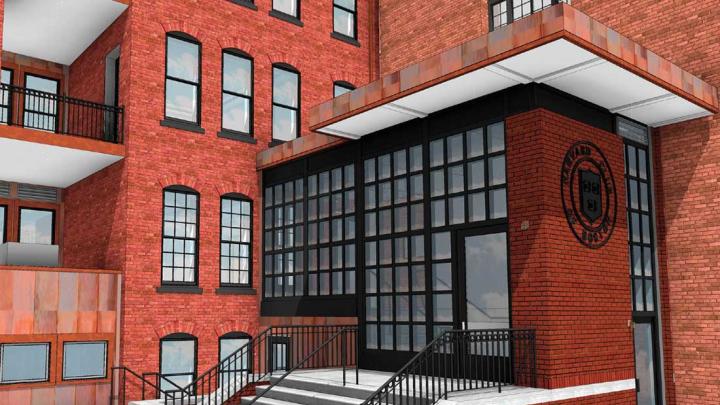The construction in the parking lot behind the Harvard Club of Boston (HCB)—facing the Mass Pike, rather than Commonwealth Avenue—is a harbinger of improvements to come. Ordinary though it may seem, the current work underpins a new back entry that will eliminate the maze of ramps and intersecting corridors that now confound members and guests proceeding to functions in Harvard Hall and elsewhere upstairs. The entry, in turn, is part of a larger transformation that will renew the club’s basic systems (the sole elevator is of World War II vintage), rationalize traffic patterns (so that guests do not collide with servers rolling carts of food), and update facilities for twenty-first-century use.
General manager Steven P. Cummings, who came to the club in late 2012 and must now juggle operations during major rebuilding, said that, at a minimum, the goal was to address the overall flow of club members and staff “so they meet in the service experience,” rather than colliding as they vie for the elevator. The new rear entry is only one element of an interior overhaul that will effect more substantial changes: constructing a new elevator for guests (dedicating the existing one, updated, to service use); separating kitchens to serve the Boston Room and, for plating and serving, Harvard Hall; and reconfiguring much of the first floor, where people enter from Commonwealth.
The Boston Room will become an updated restaurant (with the adjoining Back Bay Room emerging as a wine-themed dining space), preceded by a cocktail lounge supplanting the current front desk, lobby terrace, and office space. The current cocktail lounge, on the left of the lobby, will become pre-function space for Harvard Hall, and accommodate small private lunches and dinners. The front service desk will be relocated to that side of the lobby as well—the better to welcome guests. All will be served with new heating, ventilating, and other systems, brought up to code, and refinished historic interiors. This work, expected to be done from February through next fall, is funded in part from the $8-million proceeds of the sale of the upper floors of the annex (above the Boston Room), which are being converted to private condominiums. Assuming all goes as expected, Cummings said, the master plan envisions future work: a new tavern and cyber café in the current athletic space, with an open kitchen and seating for 100 casual-dining patrons; the existing grill reprogrammed into a business center/library, childcare facility, and central reception area for users of athletic facilities and the squash courts. The 25 guest rooms (down from 42, after the annex conversion) will gradually be redone as well.
Maintaining calm in the face of the impending construction, Cummings said the first phase of the work, this year, is “a little jolt to keep the existing members and bring in new ones”—now including MIT affiliates, given that campus’s location just across the Charles River. Thus, the project is both a physical updating and an attempt to make the HCB “more family-centric.” As a club, he emphasized, it has an obligation to know its customers and “a unique opportunity to provide a very high level of service,” in quarters to match.








